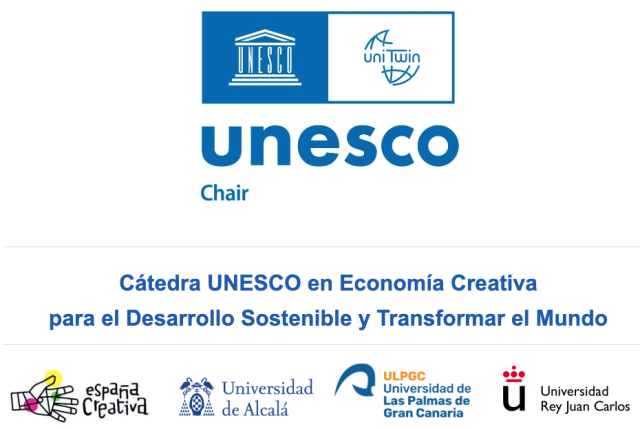IATEXT co-directs the UNESCO Chair in Creative Economy for Sustainable Development and Transforming the World
In 2022, UNESCO awarded the consortium formed by the universities of Alcalá, Las Palmas de Gran Canaria and Rey Juan Carlos, together with the España Creativa association, the UNESCO Chair on Creative Economy for Sustainable Development and Transforming the World. This UNESCO Chair will be housed in the association España Creativa and has three university partners who provide experience in research and transfer from the fields of specialization of the different groups that make up it: the University of Alcalá, through the Department of Architecture; the Rey Juan Carlos University through the STRATEGOR High Performance Research Group of the Department of Business Economics (ADO), Applied Economics II and Fundamentals of Economic Analysis; and the University of Las Palmas de Gran Canaria through the University Institute of Textual Analysis and Applications.
The Chair is directed by Dra. Belén Elisa Díaz, President of Creative Spain and international consultant in Creative Economy, Creative Cities and Sustainable Development, and has three academic co-directors from the three partner universities: the Professor of Architecture at the UAH, Dra. Rosa Cervera Sardá, the Professor of Business Organization at the URJC, Dr. José Ángel Zúñiga Vicente and the Full Professor of Historiographic Sciences and Techniques of the ULPGC, Dr. Manuel Ramírez Sánchez .
This UNESCO Chair in Creative Economy, which is aligned with the objectives of the 2030 Agenda of UNESCO and the UN, aims to “contribute to transforming the world, through training, research, dissemination and empirical network implementation, promoting creativity, culture and innovation in sustainable development from the local level and placing the human being at the center of the system as the protagonist of change.” The IATEXT contributes its experience in the field of research and transfer in humanistic areas, particularly in relation to historical and cultural heritage, taking advantage of the potential of Digital Humanities to contribute to the transformation of cities and territories.
The UNITWIN and UNESCO Chairs Program began its journey in 1992, in the period in which Dr. Federico Mayor Zaragoza was Director General of UNESCO. This program, which currently brings together more than 850 institutions in 117 countries, is intended to foster cooperation and inter-university links on a global scale with the aim of strengthening institutional capacities through knowledge exchange and collaboration. The program supports the implementation of UNESCO Chairs and UNITWIN networks in priority issues linked to UNESCO's spheres of competence, namely education, natural and social sciences, culture and communication.

